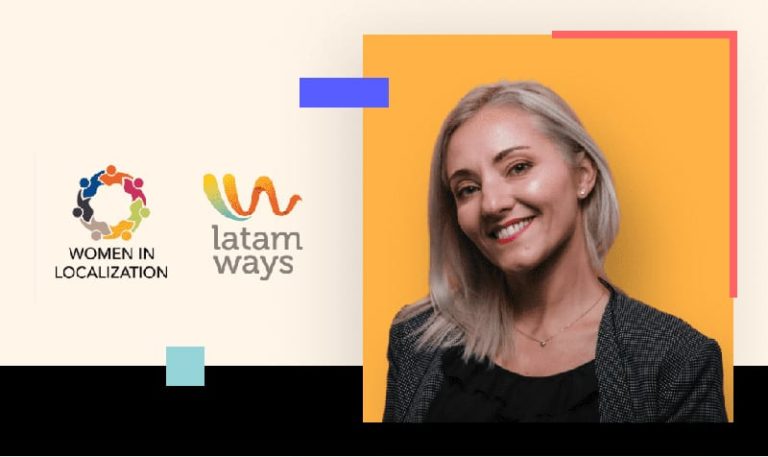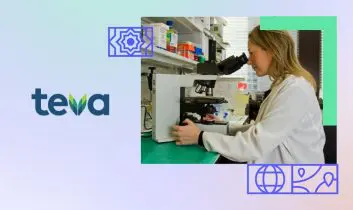
Localization Leaders: Meet Cecilia Maldonado
In BLEND‘s Localization Leaders series, we sit down every month with industry leaders who are paving the way for advances in localization through their work. For the first post of the series, we spoke with Cecilia Maldonado, Director of Strategic Accounts at Latamways and recently appointed President of Women in Localization.
Can you tell us about your background in the language industry and how you got started in the field?
My background has always been in the translation industry and I’ve always been my own boss. I started my own company back in 1999, as soon as I graduated from the National University of Cordoba (Argentina) where I studied for 5 years to graduate as a Certified English Translator. At the time, there was not such a bright future for translators in the country, so my partners and I started looking outside of Argentina. We discovered a completely different situation in terms of opportunities and technology! We started exporting our translation services instead of waiting for Argentina to open up the opportunities, and that’s how I really got started in this industry.
You started your own company. Tell us a bit about how that came to be, and what your role has been over the years.
I’ve actually started three companies. My first company was called IMW Translation & Training, which later became IMTT. This was when we started traveling and seeking professional opportunities abroad. About 10 years later, the partners at IMTT decided to go separate ways and I founded SpeakLatam with the incredible support of two key IMTT employees, one of them a partner today at Latamways.
The industry in Argentina is so fragmented that I started thinking about joining forces with other small companies so that we could have a better chance at competing for market share. I started throwing this idea to colleagues, and one, Agustina from Two Ways Translations, listened. Conversations, preparation, negotiations, and consulting took around an entire year before we were ready for the merger that gave birth to Latamways.
How did you get involved with Women in Localization?
I’ve always been involved with the different industry organizations and even played an active role in the development of the local industry. I was involved in organizing the first translation and interpretation conference in Córdoba and co-founded Translated in Argentina. Our vendor management and Think Latin America events were held in Brazil, Mexico, Dublin, the US, and almost in Egypt (we had to cancel due to local conflicts). I was the Chair for multiple conferences, including Translated in Argentina and the ALC Annual Conference and Unconference.
As for how I started volunteering with Women in Localization, a few years back, a long-time industry friend invited me to join her program under the leadership of one of the WL co-founders, and I loved the experience. I went from a volunteer in the Chapters program to working as a Geo Manager for the Americas, to Program Director and then joined the Board, where I was first voted VP and then became President.
How has the role of women in leadership changed in the localization industry over the years?
The translation industry is led by women in general. What I’ve seen more and more is women wanting the leadership roles and working hard for them. Our job at Women in Localization is to make sure that those women who do want to step into those roles are prepared. We do this by generating positions within the organization that allow women to exercise their leadership skills and improve them. We create opportunities for them to be mentored, form connections with significant leaders in the industry and learn from them, and maybe even get jobs from these connections.

At some point, all of this work is going to make an impact. We’re going to see more women on boards and in leadership positions around the world in different industries. Unfortunately, the business world remains a male dominated one, so we need to continue to work for this to change. It’s not just about there not being enough opportunities for women to take on leadership roles, it’s about being prepared to fight for those roles.
Why do you think that in Argentina the translation industry is led by women?
Let’s put it this way – when I decided to study translation, my dad asked: “And what else?” In Argentina, this is a 5-year degree, not short nor easy. But my dad´s question gives you an idea of how translation, and even language studies in general, were perceived as the path to an uncertain future. Argentina is not a diverse country, and therefore, the needs for these services are scarce. English teaching, however, was always seen as a great job for women, since it allows “moms” to work part-time.
When I graduated, making a living as a translator in Argentina was unheard of. I remember, to this day, my first day at University when one of the professors, during her welcome speech, said “If you want to make money in translation, forget it. Go find something else to study.” But, as with anything you decide to study, it’s all about how hard you work and how passionate you are about being able to change things. Today, 20 years later, with the rising prevalence and importance of Spanish translation, Argentina plays a key role in our industry since “it is the preferred market for outsourcing and one of the largest employers of talent”, says Nimdzi in their report “The Argentinian LSP landscape“.

What advice would you give to people in the localization industry who are looking to obtain leadership roles and advance in their careers?
Make meaningful relationships, be visible and have an active role in the industry. Get out of your comfort zone, out of your regular group of peers, to gain a different perspective. It can be so enlightening and enriching!
From my own experience, I’d add take risks, don’t be scared to change your circumstances and be bold. Use every experience you have to learn and always show up ready. Find people you trust and ask for advice, referrals, and suggestions.

In honor of Women’s History Month and International Women’s Day, what else can you tell us about Woman in Localization? How can someone who is interested get involved?
Women in Localization is an amazing organization that offers benefits for both volunteers and members: mentorship programs, education, networking, exclusive content, and much more.
If you want an active role, we are always looking for volunteers! We are a very international organization with 28 chapters in 20 different countries, 9 programs, more than 5,000 members, 17k+ LinkedIn connections, and we produce more than 100 events a year.
Need fast, high-quality translation?
Translate nowWhat our customers are saying







